23 BEST Things to do in Vilnius

Is Vilnius worth visiting? Heck Yes! We think it is one of the best capital cities in Europe! There is a wide range of things to do in Vilnius for all visitors, and it’s a highlight of any trip to the Baltics. It’s a quaint city with a population of half a million and extraordinarily welcoming. It’s the perfect place to get lost for a few days and a popular stop on the Baltic tour route.
Streets are cobblestoned, and the city center is the largest preserved example of European baroque architecture. It’s littered with Catholic and Orthodox churches, and no matter where you are in the city, you can see the ever-present Gediminas’ Tower.
The largest city in Lithuania is full of small cafes, charming shops, restaurants, art, and history. We enjoyed exploring and can’t wait to return one day. It was the second stop when we started this website a decade ago, and we still have fond memories of the city.
VILNIUS AT A GLANCE
- When to Visit Vilnius: The best time to visit Vilnius is in the summer months, from May to September, with the warmest months being June, July, and August.
- Where to Stay: Hotel Vilnia is the nicest hotel in the area and well worth a stay!
- How to Get Around: Vilnius Old Town is one of the largest in Europe, and you can easily get around on foot or with public transit. See Susisiekimo paslaugos.
- Top Three Things to Do: Walk Around Old Town, Hike Up Gediminas’ Tower, and a day trip to Trakai Castle.
- Things to Know: The name Vilnius originates from the Vilnia River.
Best Things to Do in Vilnius
Explore the Old Town

A European city with an old town is nothing new, but it is almost always well worth exploring. If you only have one day in Vilnius, I highly recommend staying at a hotel in the old town and wandering around day and night. Vilnius’s old town is quite large but easy to navigate. The baroque architecture is abundant, and plenty of cafes to dip into and enjoy a coffee.
The streets are bustling at all hours, and there is a cafe every ten steps. The cobbled streets are spotless and boast many touristy sites like St. Anne’s Church and the Presidential Palace. This was one of our favorite things to do in Vilnius and any town in Europe, for that matter.
Gate of Dawn

Another great thing to do in Vilnius, Lithuania, is visiting the Gate of Dawn. Also known as the Sharp Gate, the Gate of Dawn is a staple sight if you see the country’s capital. It is particularly notable as it is the last remaining gate of five from the wall that once surrounded the city limits.
Due to the gate’s age (construction on the wall began in 1503) and the famed painting of the Blessed Virgin Mary in the nearby gate chapel, the site attracts pilgrims and travelers from all over the world. Nowadays, it’s something of a shrine. Since the Virgin Mary is often associated with sunrise, the gate became locally known as the Gate of Dawn.
Head into Uzupis
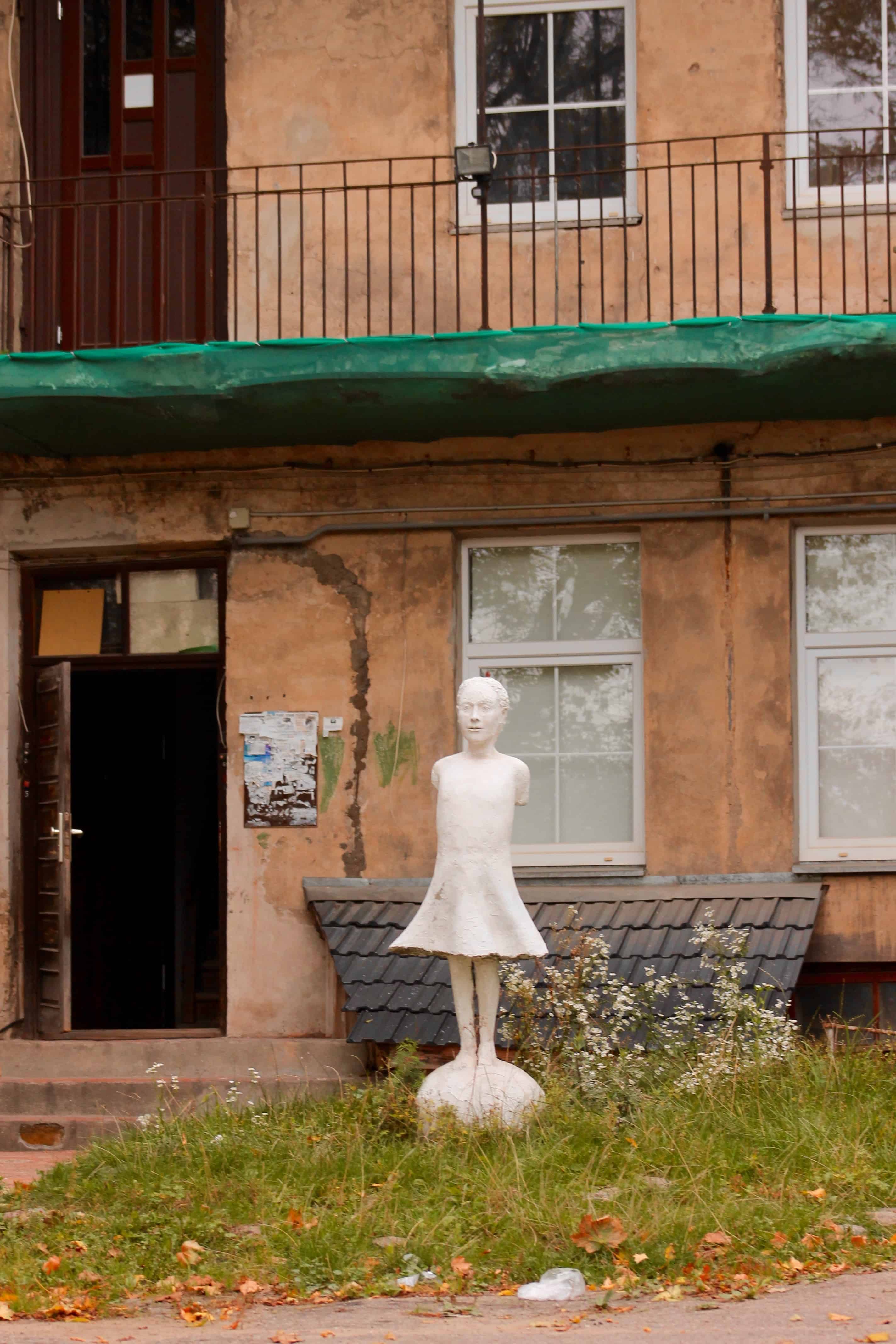
Another one of the best things to do in Vilnius is walk around Uzupis. We crossed the bridge over the Vilnia River without even realizing it and were in the Republic of Uzupis, a self-governing “free town” similar to Freetown Christiania. Uzupis has its own president, currency, and constitution and is very charming to walk around. The small area has a bohemian and artistic feel, and you can explore the art installations while lazing about the Vilnia River.
Wander Around Bernardine Cemetary

I’ve never enjoyed visits to the cemetery, but this particular Lithuanian cemetery is gorgeous in Vilnius. Just east of the Uzupis district, you will find the peaceful graveyard overlooking the city. Venture in and pay your respects. You won’t regret it. It is also one of the many free things to do in Vilnius.
KGB Museum // Museum of Occupations and Freedom Fights

If you’re up for it, the Museum of Occupations and Freedom Fights (also known as the Genocide Museum) is worth a visit to pay respects and homage to a dark period in the country’s history. The building’s history is one of invasion and bloodshed; it first served as the Gestapo headquarters during the Nazi occupation in 1941. When the Soviets retook the country in 1944, the KGB used the building to detain, imprison, torture, and execute all those who resisted Soviet rule.
The building is now a museum, where visitors can tour three floors; the top two outline the country’s day-to-day life and Lithuanian resistance against the Soviet Union, while the basement houses the prison where torture and execution would occur. This museum is a chilling reminder of occupation, power, and the consequences of fighting back.
Eat at Snekutis

There are three locations around the city where you can try cheap local Lithuanian food. They have many draft beer options ranging from €1.30-€3. Come hungry and leave 10 lbs heavier from the hearty meat and potato pancakes. Now would be a good time to walk around the old town. Remember that in many parts of Europe, it’s common to tip 10% on food bills; read more about tipping in Europe.
Hike Up to Gediminas’ Tower

For the best views of Vilnius, head up to Gediminas’ Tower, the remnants of the upper castle. The museum inside costs €2.
Three Crosses Hill

Once you’ve completed the tower, walk down and head to the stairs leading to The Three Crosses. At the top, you will find amazing 360-degree views of Vilnius. The monument is a dedication to Lithuania’s dark past with the Soviet Union. I think this is one of the most extraordinary things to see in Vilnius.
Take a Day Trip to Trakai Castle
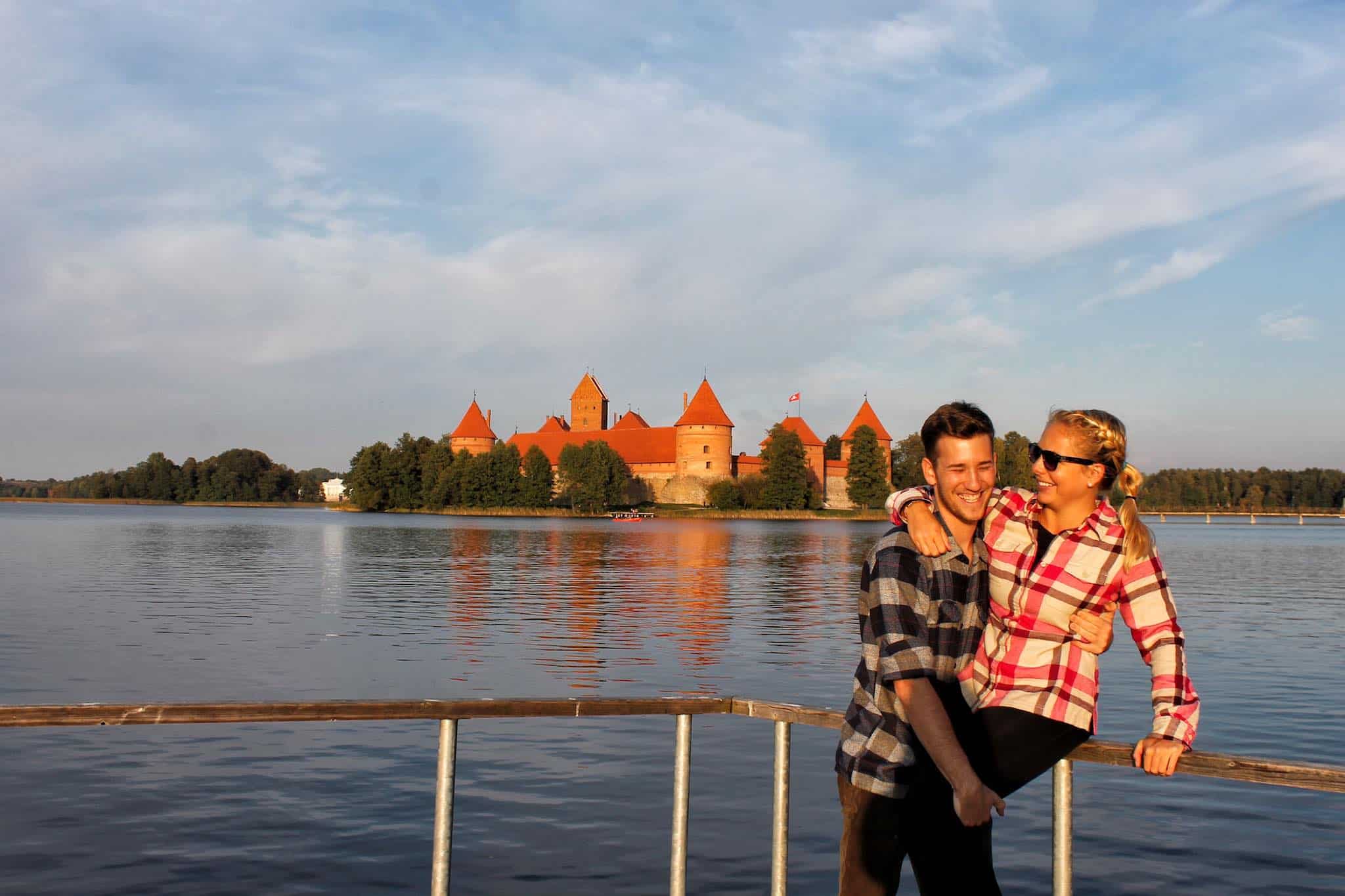
We recommend Trakai Castle as one of the top things to do in Vilnius, even though it’s not in the city. It makes for a perfect day trip and only takes a 30-minute bus ride. The most popular thing to do in Trakai is visit Trakai Castle, a 14th-century castle surrounded by Lake Galve. It’s stunning, and I highly recommend paying to go inside. At least a half-day is recommended for this day trip; buses leave regularly from the city.
Catch a Play!
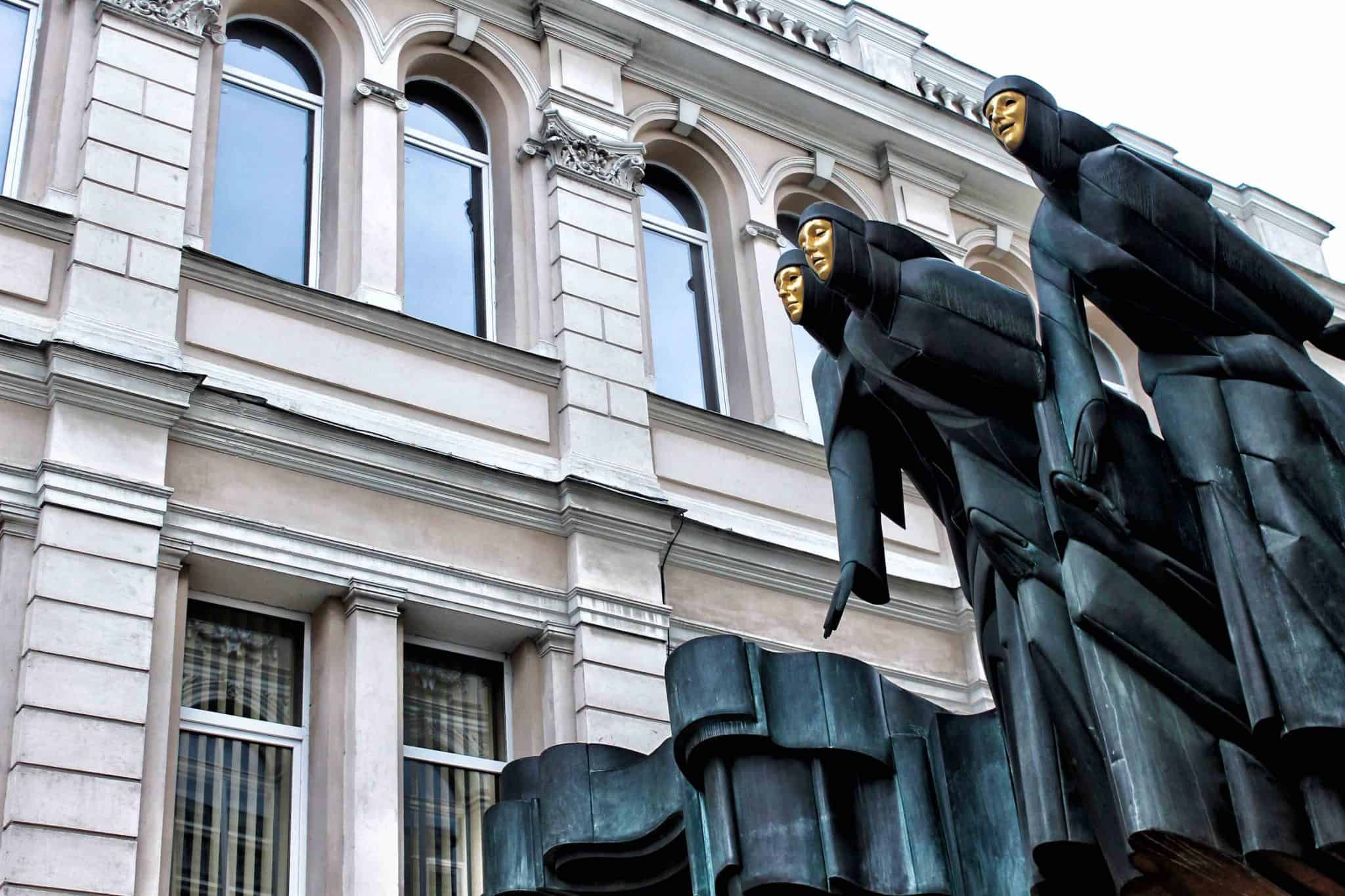
The Lithuanian Opera and Ballet Theatre has numerous performances every week. Tickets are incredibly affordable, starting at just €3 apiece. Catching a show is perfect for couples, especially those looking for a romantic night in Vilnius.
St. Peter and Paul Church
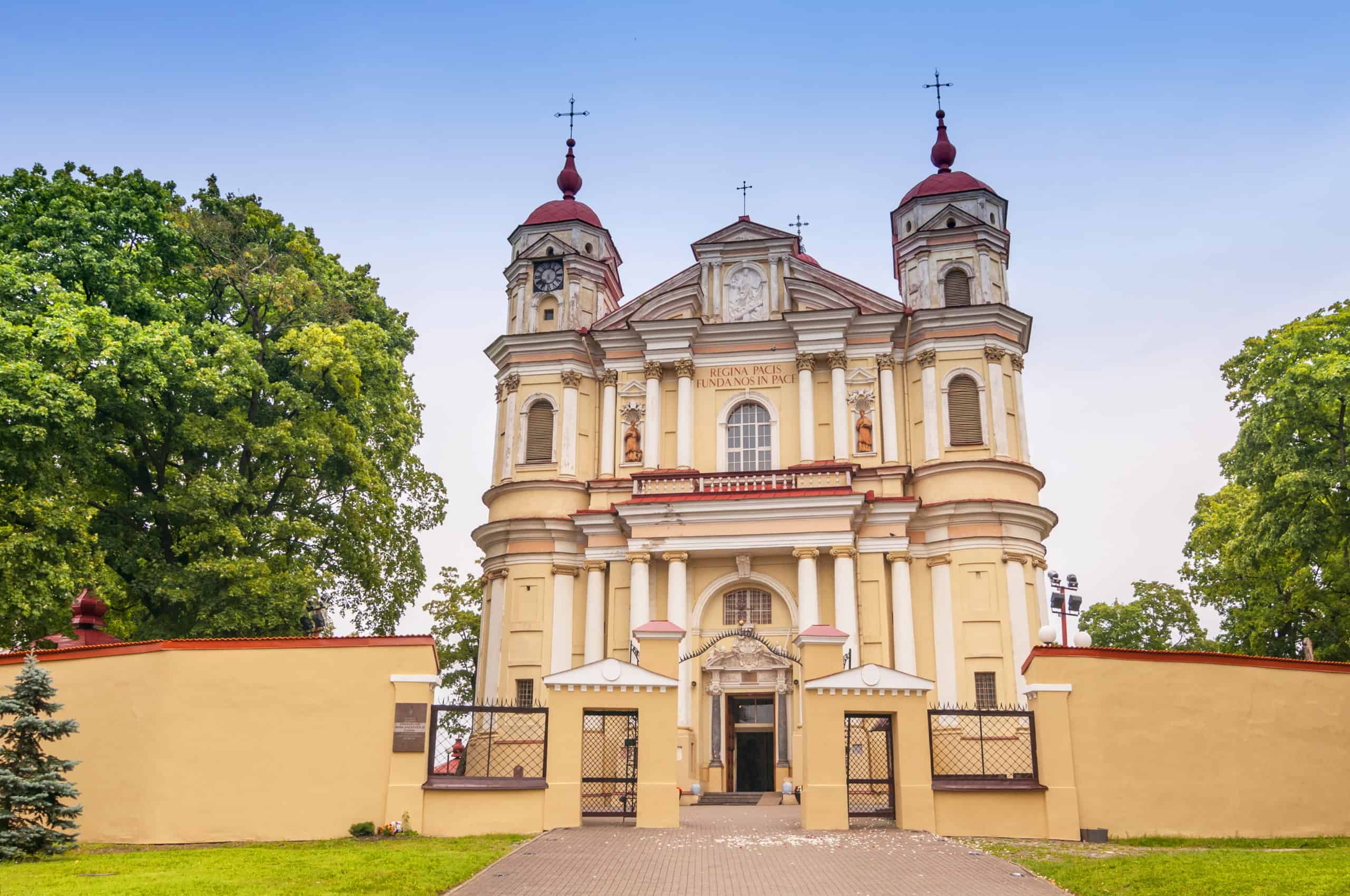
Several publications have frequently referred to the Church of St. Peter and Paul as among the most beautiful in Europe, alongside churches in cities such as Venice, Madrid, and Krakow. Once you arrive, it’s not hard to see why. The interior is a vibrant display of baroque architecture, and over 2000 stucco figures decorate the church hall.
Though the church was originally a simple wooden structure, it was destroyed during a war with Russia. Its reconstruction resulted in the building that stands today, a rich and visually astounding tapestry of styles. The inside has a central nave, side altars, and several chapels. Though its interior is a fascinating blend of styles and decor, no surviving records explain who may have designed the stunning interiors.
Church of St. Johns

If you’re passing through the city’s Old Town, then chances are you won’t be very far away from the Church of St Johns. Annexed as part of the Vilnius University, the church’s interior is Gothic, per its original construction, while its exterior now reflects the late Baroque style after it was redesigned. It has always been (and continues to be) a site for significant community events in the city, from protests and performances to royal welcomes.
If you want to take your visit to the next level (pardon the pun), visit the church’s campanile. At only €2,50, it’s the highest point in the city, meaning that any other structure can’t match the views you’ll get from the top of town.
Church of St. Theresa

Built by an Italian architect in the Baroque style, it’s no wonder the Church of St Theresa was such a visually attractive structure. Its exterior is intricate (mostly sandstone and granite) but not particularly embellished; the true jaw-dropping beauty was saved for the interior. Its altar is one of the highest and most beautiful in the country.
The high vaulted ceilings, bright frescoes, and incredibly detailed carvings and sculptures make the inside of the church truly a wonder to see. It’s incredibly close to the Gates of Dawn, so bundling the two can help you manage your time to maximize your day.
Stebuklas, the “Miracle Tile”

It’s not quite a wishing well, but according to legend, this magical tile tucked away in Cathedral Square can grant wishes and make your dreams come true. Whether or not that’s true is up for debate, but the stone has a much richer history than simply granting wishes: it was once a powerful display of quiet protest during the dying days of the country as a republic under Soviet Rule.
Around two million people banded together to make a human chain by holding hands from Estonia, through Latvia, and finally ending at the tile in Vilnius—a powerful statement against the rule of the USSR and highlighting the strength of human spirit and togetherness. It’s supposedly most effective as a lucky charm if you stumble upon the tile without seeking it out, but you’ll never know until you try!
Vilnius Cathedral
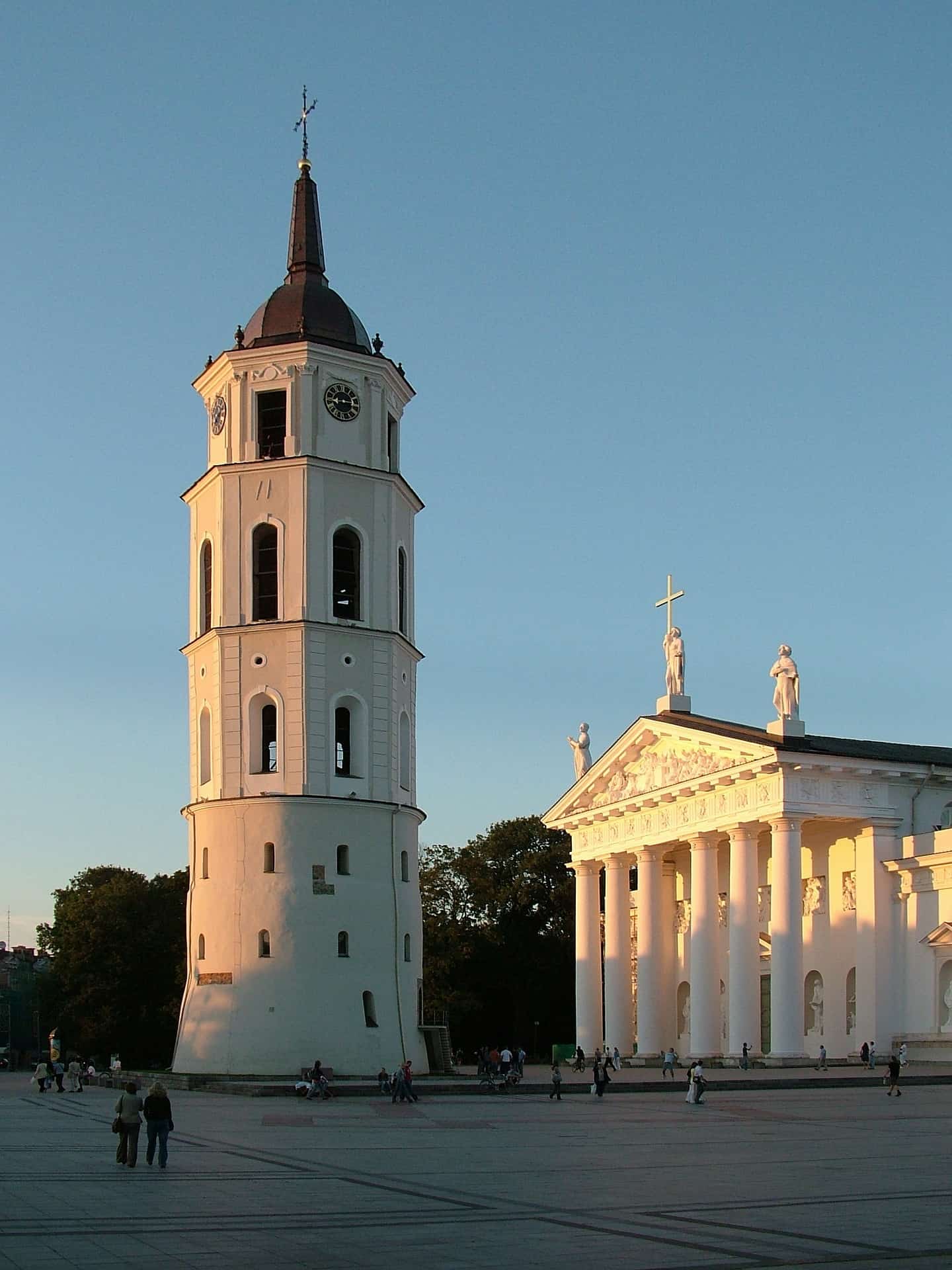
If you’re looking for a list of staple things to do in Vilnius, you can’t miss the Cathedral and its basilica. Its exterior is austere but inviting – a glorious display of bright white façade and large stone pillars. Multiple statuettes of evangelists and saints adorn the exterior. In the square just outside stands the freestanding bell tower, which shows where the river originally flowed through the city.
While the cathedral’s bare and undecorated interiors bear witness to the repercussions of Soviet rule, visitors can still appreciate the size of the interior hall and even take a guided trip to the cathedral catacombs, where many dukes and kings are buried.
National Museum of Lithuania

Many people don’t think of Lithuania as a premier holiday destination, so chances are if you’re here, you’ve got some interest in culture and history. If that’s the case, there’s no better way to immerse yourself in its rich history than to visit the National Museum. The displays showcase the history of Lithuania up to modern times. There is a monument nearby dedicated to the country’s last king. A funicular nearby will take you up Gediminas Hill.
The museum’s exhibits are specific and detailed, with displays ranging from numismatics (ancient coins) to archeology and iconography. It’s closed on public holidays, but at only three euros, it makes for a great, inexpensive daytime activity, where what you’ll see far outweighs the admission fee.
The Artillery Bastion

We’re pretty into old things, but we will give bonus points if they are old walls. Seeing ancient structures like this—particularly ancient defensive structures—holds a level of fascination often not present in your typical church or museum. The Artillery Bastion was first built in the 17th century and became damaged during wars with Moscow.
Much of the bastion remains; the tower, underground gun ports, and tunneling are still mostly intact. A connecting museum showcases some more military-specific history of the city as it relates to the wall. After you’ve had your fill, step onto the Bastion Terrace for some seriously spectacular city views.
St Casimir’s Church

If you passed a pinkish church and wondered what it was, it’s St Casimir’s Church. Built by Jesuits to honor St Casimir in 1604, the original structure was burnt down several times over a few decades. Thankfully, it was finally restored to the façade that stands today—hence why its decor is a patchwork of Baroque, Renaissance, and Gothic.
Its attractive exterior is just a preview of the inside detail; rich and intricate baroque altars adorn the inner hall. During the Second World War, the museum was closed, mimicking the fate of many churches in the country. It became a museum of atheism until 1988, when it was re-consecrated and reincarnated as a Catholic church.
Uptown Bazaar
You could call this a food court if you wanted to, but you wouldn’t be doing it justice. The Uptown Bazaar is a vibrant mix of scents and sights, with a near-endless array of dining options – from international cuisine like ramen, tapas, or Thai, to national dishes and burger joints and taco stands.
Bring your appetite; you won’t leave here hungry as it’s one of the best places to eat in Vilnius. This spot is for everything – from a casual brunch or a huge dinner party to laidback drinks at dusk. Boasting 27 restaurants and bars, there is even a fresh grocer where you can purchase produce and other goods—just in case you’re more of a DIY person.
Enjoy the Street Art

Another thing to do when wondering what to do in Vilnius is a street art tour. It’s not your typical thing to do in a European city, but a street art tour is still a pretty excellent way to cast new light on ancient surroundings. Like many other cities worldwide, Vilnius has its fair share of street and graffiti art. A little tour of the notable points around town can be a great way to see the city while getting a little exercise and venturing off the beaten tourist path.
Arguably the best-known piece is the wall featuring Trump and Putin – the latter having cigarette smoke blown into his mouth (the original wall featured a passionate kiss, but after some controversy, the mural was adjusted). The wide range of artistic styles, colors, mediums, and mural sizes indicate some serious talent rampant in Vilnius, so even though this is a more time-consuming outing, it’s worth seeing the art.
St Anne’s Church

This particular church is a little more ornate than many others in the city. It’s generally seen as a Gothic masterpiece that has retained all of its original glory and grandeur, having fortunately come to no harm or destruction in her 500 years of standing. Its original structure was a wooden church built for Anna, the Grand Duchess of Lithuania.
A beautiful bell tower – also constructed in the Gothic style – stands nearby. Not surprisingly, Napoleon fell in love with it—so much so that he wanted to take it back to Paris in the palm of his hand. Unfortunately, this was impossible, so he may have needed to come back for a visit or two. The church is an easy walk from the nearby cathedral, which can be tacked on to your cathedral visit.
Christopher Summer Music Festival
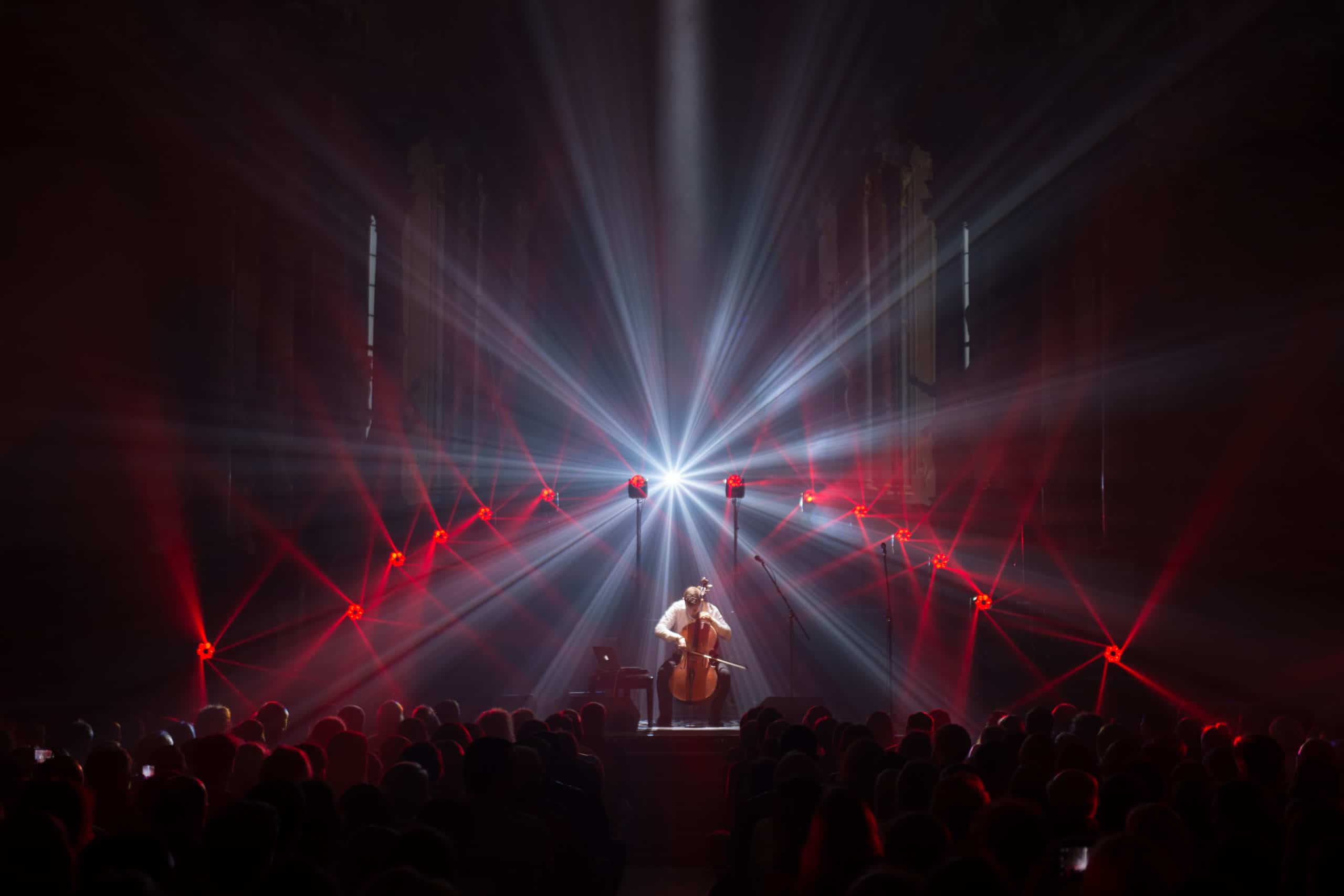
This is limited to those traveling to Vilnius in the summer months, but its status as a cultural city icon earns it a mention on this list. One of the country’s longest-running music festivals, it takes place over a period of two months, with countless musical acts across dozens of venues throughout the city. The general theme behind the festival is diversity; this comes across in the musical acts, the artists which travel from all over the world to perform.
Everything from sacred choir music and smooth jazz to a group known only as the Crazy Saxophones play for this festival. It’s a little quirky and definitely on the experimental side of creativity, but well worth taking in a show or two if you’re in Vilnius over the summer!
Vilnil Museum of Illusions
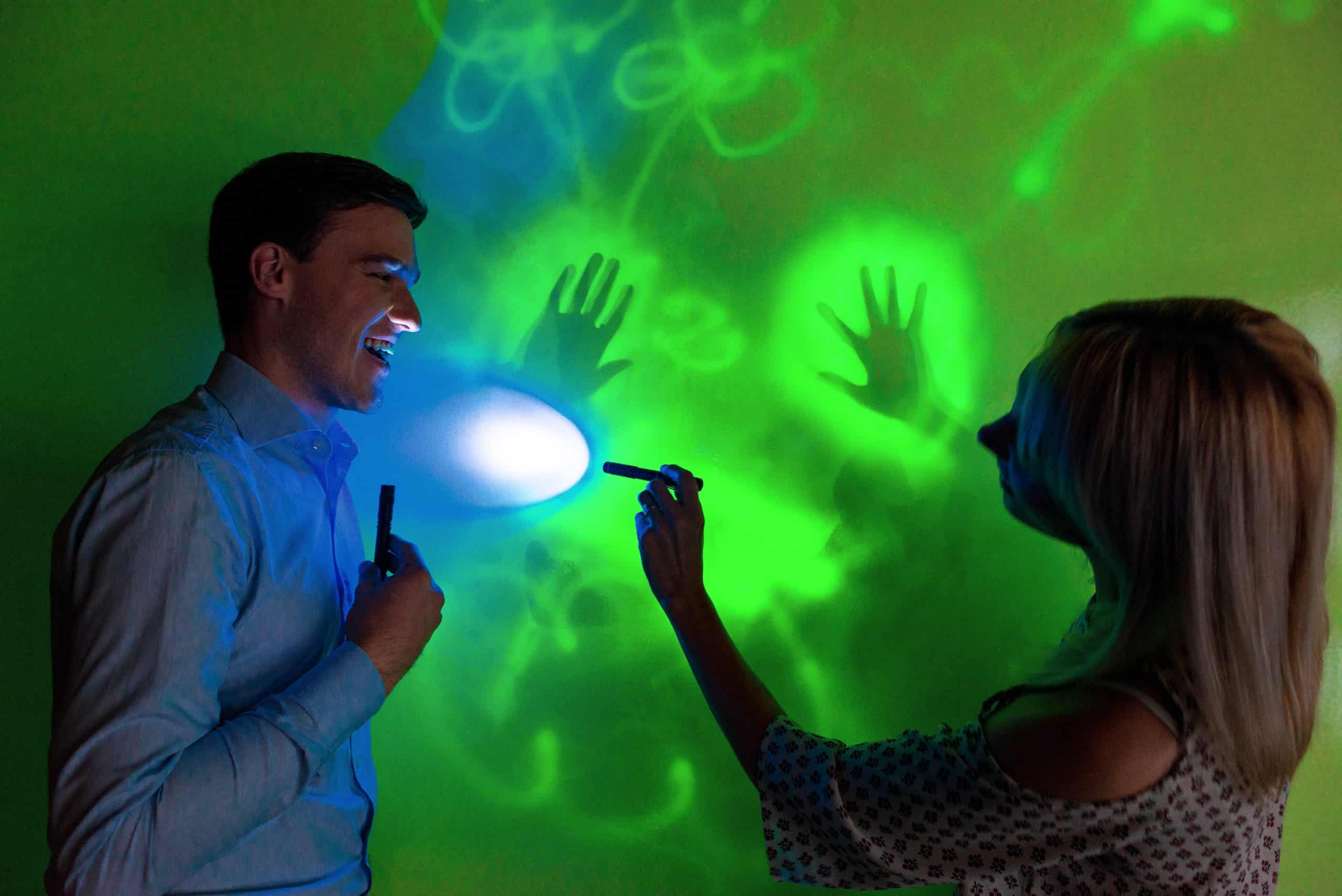
Most museums tend to be historical, and while Vilnius does have its fair share of museums depicting the city and country’s rich history, this particular museum is a little more on the fun side of things. It’s fairly new—only open since 2016—and features over 70 exhibits featuring mind-bending optical illusions, virtual reality, and installations designed to have you questioning your eyes!
There are also dance performances, most of which are combined with an LED light show for something truly visually spectacular. While this won’t enrich your view of Lithuania or help you understand its history, it’s an excellent way to unwind after a day of exploring churches and human history museums.
More Information On Vilnius
Maps

Restaurants
- Pirmas Blynas: Inventive recipes, menu items like sweet & savory pancakes, plus vegan options.
- Telegrafas: Located in the Kempinski, this is a great upscale restaurant in Vilnius to try.
- Selfish Bistro Vilnius: Great seafood options like oysters, mussels, and tuna tartar.
Where to Stay
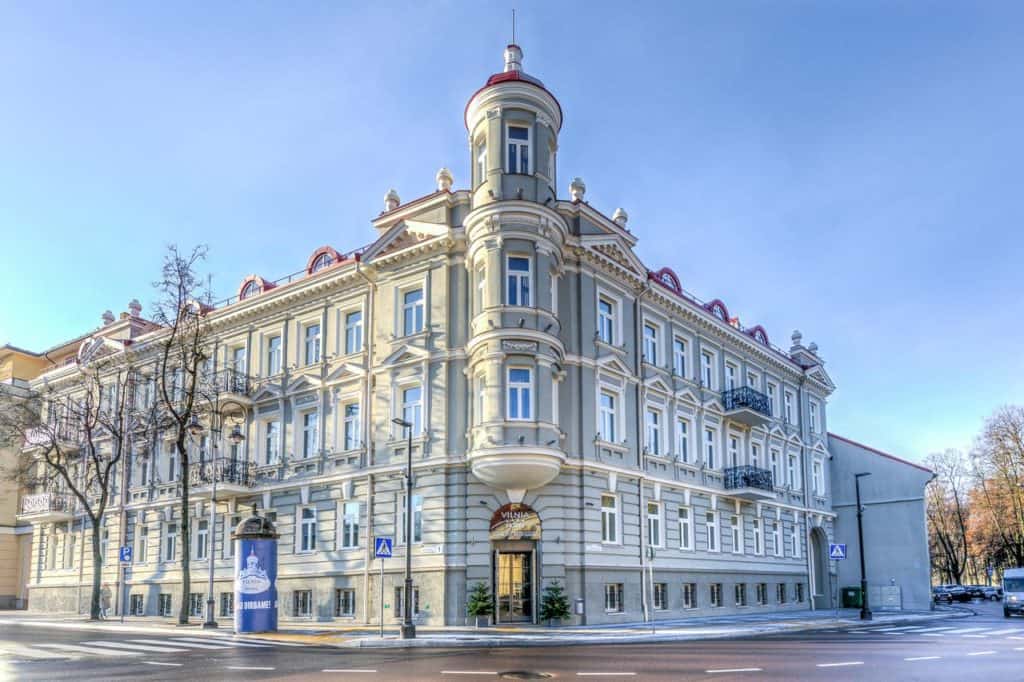
Hotel Vilnia
A beautiful 19th-century building in Vilnius, Hotel Vilnia is minutes from Gediminas’ Tower and has an on-site restaurant serving local cuisine.

The Joseph
In the heart of the Old Town district of Vilnius, The Joseph Signature Hotel Vilnius is only 300 m from the Lithuanian National Opera and Ballet Theatre and an 8-minute walk from Gediminas’ Tower. It’s centrally located and beautiful inside.
Plan For Your Trip
- Protect Your Trip: We don’t travel without travel insurance, nor should you. You never know what can happen while traveling, so it’s best to be prepared. HeyMondo provides excellent short-term and long-term travel insurance plans.
- Find Cheap Flights: Sign up for Going (formerly Scotts Cheap Flights) to get notified when prices get low.
- Book a Rental Car: We use Discover Car to book all our rental cars! You can also read our top tips for renting a car abroad here.
- Travel Adapter: Make sure you find a good adapter to keep your personal electronics charged. Otherwise, you may be paying for a cheap one once you land. Purchase one here.
- Travel Backpack: We like the Nomatic Travel Backpack for our travels. Check the price here.
- Our Favorite Travel Shoes: Our answer to this question is always Allbirds! Check them out on their site!
- Get a Travel Credit Card: We travel worldwide for free because we have leveraged our spending into points. See how you can do the same with our favorite travel credit cards.

